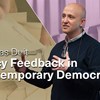upcoming
Utopia becoming Dystopia?
Analyzing political trust among immigrants in Sweden Arbetsrapport 2011 nr. 10 Abstract A healthy democracy demands critical citizens. But to what extent is trust in political and judicial institutions a
Becoming a business student: Negotiating identity and social contacts during the first three months of an elite business education
Institute for Futures Studies, working paper 2022:13, 23 pages. We know that informal networks explain differences in career success. Historical differences in business careers of men and women have fr
"Botten Ada" - Predicting the Swedish Election Using a Bayesian State-Space-Model
Research seminar with Jens Finnäs (J++), Måns Magnusson (Assistant Professor in statistics at Uppsala University), and Jonas Wallin (Associate Professor at Lund University). Register In the Swedish elect
Bo Rothstein: The Shadow of the Swedish Right
Venue: Institute for Futures Studies, Holländargatan 13, Stockholm, or online. RegisterResearch seminar with Bo Rothstein, Professor of Political Science, University of Gothenburg Abstract In the recent

Andreas Duit: Policy Feedback in Contemporary Democracies
How Policy Creates Politics: Policy Feedback in Contemporary Democracies Research seminar with Andreas Duit, Professor at the Department of Political Science, Stockholm University. Andreas Duit works

Progress in Ethics
This is an international network of researchers from a variety of disciplines, providing a forum for discussions on what progress have been made in the field of ethics.
The good man's racism?
It is becoming common for political parties with xenophobic views to appear in parliaments in Europe, Sweden is no exception. There is an ongoing debate about xenophobia and diversity in the media, in
Family dynamics of immigrants in Sweden
Kirk Scott, the Institute for Futures Studies and Lund University Union formation and entry into parenthood are perhaps the most important transitions to adulthood. While much is known about the family
Study Achievement for Students with Kids
Abstract Few get children while enrolled in higher education, nevertheless one fourth of female university students in Sweden has children. Using a large longitudinal data set containing educational ac
Public broadcasting and democracy’s defense: responses to far-right parties in Germany and Sweden
Democratization, vol 30, issue 6 Abstract This article studies the response by public sphere institutions in democratic societies to far-right parties, focusing specifically on public broadcasting organ








